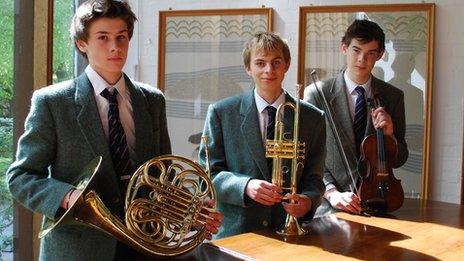'My three dyslexic sons and music'
- Published

Robert, Patrick and Luke Baldwin (l to r) all started piano aged five
Three brothers with dyslexia have overcome their struggles with reading music to be chosen to play in the National Schools Symphony Orchestra.
"I shudder to think what it would have been like without music," says Sasha Baldwin, mother to three teenage sons who are all dyslexic.
Luke, 17, plays the violin and guitar. Patrick, 15, plays the piano, organ and trumpet while Robert, 14, is a gifted French horn player. They all sing too.
Yet at primary school they struggled from early on as dyslexia manifested itself in different ways in each of them.
"Luke had difficulties learning how to read, Patrick had problems with short-term memory and couldn't remember instructions from school or telephone numbers and Robert had real problems with personal organisation and retaining information, as well as reading," Sasha says.
The North Yorkshire school they attended recognised their learning difficulties and enlisted the help of educational psychologists to support them.
But Sasha, who now lives in Perthshire, realised that music could provide a valuable outlet for their development and she encouraged the boys to start learning the piano aged five.
Although they were enthusiastic, they all had issues with reading music.
"Robert had to give up the piano after a year as he couldn't read two lines of music simultaneously and became very frustrated," Sasha says.
A-team
So he took up the horn instead, an unusual instrument for a five-year-old, but it suited him because he only had to read one line of music.
Robert is gifted, his mother says, and music has played a huge role in helping him to achieve.
His two brothers have won places as choristers at the choir of St John's College, Cambridge and all three have been invited to play with the National Schools Symphony Orchestra.
Aged 10, their school report said the boys were going to struggle to cope with exams - but they are now predicted to get A* in GCSEs.
Dr John Rack, a psychologist and head of research, development and policy at the charity Dyslexia Action, says that people with dyslexia can often do well at creative subjects.
"But we don't know if dyslexia gives you a special advantage or whether dyslexic people go in a different direction and develop alternative talents."
Dyslexia doesn't automatically mean you'll be creative or successful, he warns.
"You shouldn't feel bad if you're not creative."
'Easily distracted'
Teresa Bliss, an educational psychologist who works to help children and young people who are experiencing problems in school, says she is convinced that music can have an impact on children with dyslexia.
"Children and young people with dyslexia are often easily distracted and lacking in concentration.
"Music offers training in many of the areas where dyslexics typically experience difficulties such as understanding rhythm, sequencing, organisation, motor co-ordination, memory and concentration."
Dr Rack believes music has a more logical structure than language which means it can appeal to people with dyslexia.
"Dyslexics find it easier to learn to respond through action than through speaking or words. They can struggle to remember names, for example, but give them a task and they can make associations very well.
"Their fingers know how to play the notes, but can't always say what they are."
'Not faulty'
The key thing, dyslexics are told, is to find something you are good at and put lots of effort into it.
Reading and writing can be difficult but dyslexia affects children in many different ways, none of which are related to their level of intelligence.
However, it is the most common learning difficulty in schools, with some children needing long-term support.
Dr Rack says being dyslexic is not something to get stressed and worried about.
"It only becomes a problem if people deny it or if there's a failure to recognise the effects of it.
"Just say you're different, not faulty."
Sasha Baldwin says that music has been a great discipline for her three dyslexic sons.
"They have all improved massively. The oldest one is flying now. He reads very fast and doesn't need any extra time in exams.
"It's been a great lesson in life to practise their instrument. They would not have got this far academically without music," she says.
- Published27 June 2012
- Published29 July 2011